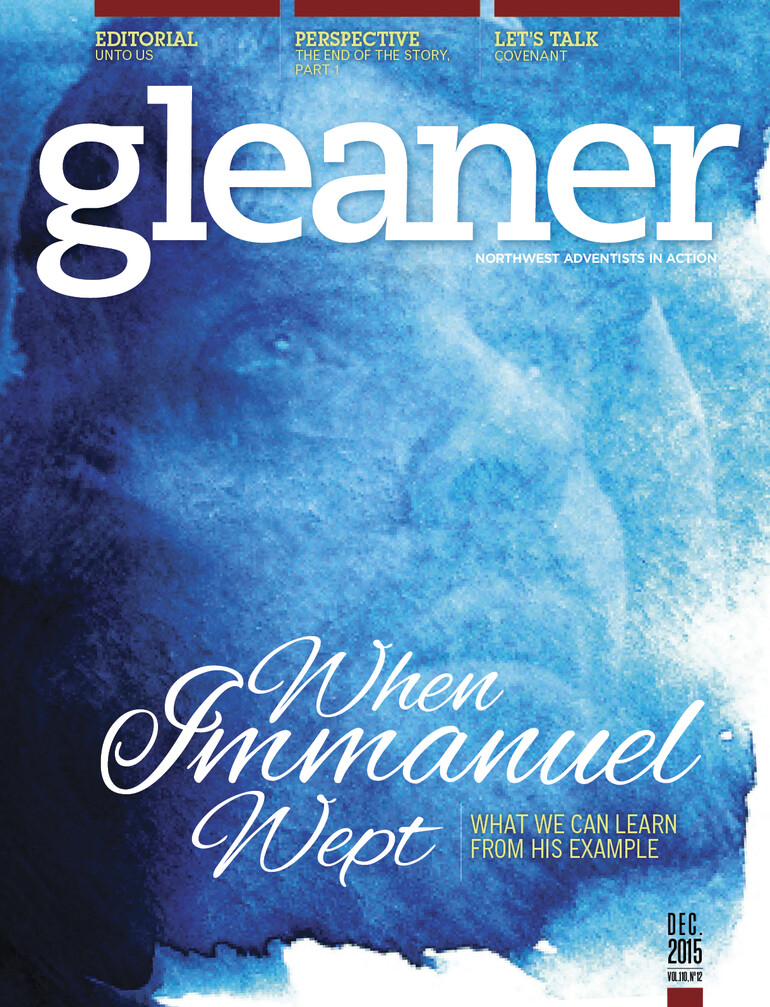It wasn’t Christmas, and I was far from the Christmas spirit. It was the day I quit trusting people. At least people who looked like him.
The morning light was still dim as I sat in the neighborhood café munching a toasted bagel. This particular year, I had embraced a personal health challenge to commute to work by bike every day, and my red Trek 1500 was parked neatly in a row of other bicycles just outside the café window.
In the middle of an engaging conversation with a couple other pastor colleagues, I glanced outdoors, and that is when I saw him — or rather, I saw my expensive bicycle traveling past the window. I jumped to my feet, yanked the door open and yelled like I’ve never yelled before in a café: “HEY!”
Startled customers looked up as I raced out the door after the thief. I was wearing cycling shoes — the running equivalent of reverse high heels. Glancing back at me, he threw his leg over the bike and pedaled away.
My mind was spinning with critical, angry thoughts. “What a worthless idiot. He needs to get a job. He’s probably going to sell it and buy drugs. Why do we allow people like this into our country anyway? He is so lazy. I bet he has a long criminal record.”
How quickly I judged. How readily I made assumptions. How naturally I assumed the worst.
I fear my thoughts that day are symptomatic of society. Prejudice runs rampant when we form a negative opinion about someone based on inadequate facts. Break the word down. Prejudice. We “pre-judge” them. Prejudice is simply an ignorant, arrogant assumption.
I’ll come back to the bike, but first we have important things to consider. Critical things. Things that many people in our nation are talking about. At first glance they might not seem to fit within the Christmas season, but actually they reveal the core of Christmas.
Our Limited Understanding
Just as the world measured Jesus through its own limited vision, we too measure others with limited understanding.
Author Stephen Covey tells the story of riding on a subway in New York on a Sunday morning. People were sitting quietly — some reading, some lost in thought, some resting or sleeping.
But then a man and his children entered, and everything changed. The children were out of control, yelling and tossing things back and forth. The man sat down next to Covey and closed his eyes, apparently oblivious to the mayhem.
Covey could not believe this father could be so irresponsible. So finally, with a valiant effort at patience, he confronted the man. “Sir, your children are really disturbing a lot of people. I wonder if you couldn’t control them a little more.”
Stephen Covey writes, “The man lifted his gaze as if to come to consciousness of the situation for the first time and said softly, ‘Oh, you’re right. I guess I should do something about it. We just came from the hospital, where their mother died about an hour ago. I don’t know what to think, and I guess they don’t know how to handle it either.’”
“Can you imagine what I felt at that moment?” exclaims Covey. “My paradigm shifted. Suddenly I saw things differently, and because I saw differently, I thought differently, I felt differently, I behaved differently. My irritation vanished. I didn’t have to worry about my attitude or my behavior; my heart was filled with the man’s pain. Feelings of sympathy and compassion flowed freely. 'Your wife has just died? Oh I’m sorry! Can you tell me about it? What can I do to help?' Everything changed in an instant.” (from The Seven Habits of Highly Effective People).
We see people that act a certain way and make ignorant assumptions. We pre-judge them. Prejudice.
But prejudice doesn’t just happen in New York subways. It happens right here, in our own towns, in our own neighborhoods, in our own hearts.
When Jesus Wept
When I first became a teacher, I wanted my students to memorize Scripture. So I told them they could choose any six contiguous verses they wanted. The first week they had to write just the first verse. I remember one clever student grinning at me as he carefully wrote “Jesus wept.” Though he likely did this to avoid challenging himself, he unwittingly wrote two of the most profound and powerful words ever penned: Jesus wept.
Here is what we know. Mary, Martha and Lazarus were a trifecta of siblings especially close to Jesus. We know that Lazarus was diagnosed with a terminal illness. We know that Jesus goes to see the siblings in spite of the fact that the last time He was there His enemies tried to stone him. We know that by the time Jesus arrives Lazarus is dead and decomposing. We know that Martha partially blames Jesus for her brother’s death when she says, “Lord, if you had been here, my brother would not have died.”
And, perhaps most significantly, we know that Jesus knows what He is about to do. Of course He does. In minutes, He will be recomposing what is decomposing. Tears of sadness will become tears of gladness. A corpse is going to walk. A funeral will become a party.
So why, then, does He weep?
John 11 has the story. “When Jesus saw Mary weeping, and the Jews who had come along with her also weeping, he was deeply moved in spirit and troubled. ‘Where have you laid him?’ He asked. ‘Come and see, Lord,’ they replied.”
And then those two words: “Jesus wept.”
The Interpreter’s Bible offers this commentary: “These tears are an authentic revelation of the divine; granting us insight into God’s mind and nature; bringing home to us some inkling of the wonder of his compassion; of the depth and the sureness of his sympathy with his needy, desperate world, and for hurt minds and hearts.”
Jesus weeps because He feels with humans. He doesn’t feel bad for them. He feels with them. He doesn’t feel pity for them. He feels with them. He doesn’t feel sorry for them. He feels with them. “Jesus wept.” The epitome of empathy.
Jesus humanized Himself not simply so He could save us, but so He could feel with us. And that is the promise of Christmas. Immanuel. God with us.
And the God who leaves the safety and sanctuary of heaven in order that He might feel with humans says, “Follow me.” Racism is not an issue. It is people. Homosexuality is not an issue. It is people. Gender inequality is not an issue. It is people. Poverty is not an issue. It is people. And the only way we can begin to humanize issues is by listening. Truly listening. Intentionally listening. Genuinely listening. And as we listen, we are given windows to the soul. And then when an “issue” is discussed, we see the face of a friend.
Truth is …
- I don’t know what it is like to be a woman.
- I don’t know what it is like to be a black man.
- I don’t know what it is like to be a teenager in 2015.
- I don’t know what it is like to be gay.
- I don’t know what it is like to be abandoned by my parents.
- I don’t know what it is like to be homeless.
- I don’t know what it is like to be broke.
But I do know of One who knows what it is like to be deeply human. Because He became “Immanuel.” God with us.
This is the gospel of Christmas. This is the gospel for the end times and for all times. And the gospel truth is, when I invite Immanuel into my heart, I start seeing people differently. It’s because He changes my heart. And prejudice — pre-judging — begins in the heart.
Learning From His Example
And to help us all follow the example of Immanuel, here are some gifts we can consider giving to others this Christmas and on through the New Year, to become channels of healing, not hurt:
1. Ask open-ended questions. Especially of those who are different than you. Then listen. Befriend them, love them. It’s nearly impossible to hate someone once you know their story.
2. Feel with people. It is called empathy. Don’t say, “I know exactly how you feel” because you don’t. But make that your goal.
3. Assume the best, in every person, in every situation.
4. See people through the eyes of Jesus. This doesn’t mean we pretend we are the same. But we see each other as family. You are my sister. You are my brother. Pray this intentional prayer: Jesus, give me Your eyes today. Give me Your ears. Give me Your heart.
5. Refuse to be a part of jokes that promote prejudice. Ending a racist remark with “I was only joking” doesn’t make it right. This is never, ever, ever, ever a joke. Ever. Ever. Ever. Ever.
6. Seek nonviolent solutions for the injustice that still occurs in our world. Engage in causes that matter to Jesus. Refuse to be silent while people suffer.
We all face an insurmountable deficit of understanding unless we remember the core of the Christmas message in the words of Paul. Jesus, he says, “came into the world to save sinners, of whom I am chief.”
Besides Paul, if anyone deserved to be pre-judged, it was you and me.
Of course I wasn’t thinking these lofty thoughts when my bike disappeared down the street. Or even a couple hours later when, through the stellar efforts of my pastor friends, other witnesses and some timely police support, I got my precious Trek 1500 back that very morning.
The bike thief, though, gave me every good reason to pre-judge him for his actions. It was the day I began to distrust people. Especially people who looked like him.
And, by the way, he looked a lot like me.










